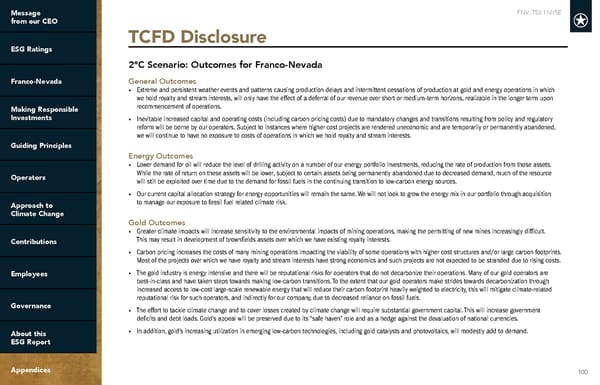FNV: TSX | NYSE 100 TCFD Disclosure General Outcomes • Extreme and persistent weather events and patterns causing production delays and intermittent cessations of production at gold and energy operations in which we hold royalty and stream interests, will only have the effect of a deferral of our revenue over short or medium-term horizons, realizable in the longer term upon recommencement of operations. • Inevitable increased capital and operating costs (including carbon pricing costs) due to mandatory changes and transitions resulting from policy and regulatory reform will be borne by our operators. Subject to instances where higher cost projects are rendered uneconomic and are temporarily or permanently abandoned, we will continue to have no exposure to costs of operations in which we hold royalty and stream interests. Energy Outcomes • Lower demand for oil will reduce the level of drilling activity on a number of our energy portfolio investments, reducing the rate of production from those assets. While the rate of return on these assets will be lower, subject to certain assets being permanently abandoned due to decreased demand, much of the resource will still be exploited over time due to the demand for fossil fuels in the continuing transition to low-carbon energy sources. • Our current capital allocation strategy for energy opportunities will remain the same. We will not look to grow the energy mix in our portfolio through acquisition to manage our exposure to fossil fuel related climate risk. Gold Outcomes • Greater climate impacts will increase sensitivity to the environmental impacts of mining operations, making the permitting of new mines increasingly difficult. This may result in development of brownfields assets over which we have existing royalty interests. • Carbon pricing increases the costs of many mining operations impacting the viability of some operations with higher cost structures and/or large carbon footprints. Most of the projects over which we have royalty and stream interests have strong economics and such projects are not expected to be stranded due to rising costs. • The gold industry is energy intensive and there will be reputational risks for operators that do not decarbonize their operations. Many of our gold operators are best-in-class and have taken steps towards making low-carbon transitions. To the extent that our gold operators make strides towards decarbonization through increased access to low-cost large-scale renewable energy that will reduce their carbon footprint heavily weighted to electricity, this will mitigate climate-related reputational risk for such operators, and indirectly for our company, due to decreased reliance on fossil fuels. • The effort to tackle climate change and to cover losses created by climate change will require substantial government capital. This will increase government deficits and debt loads. Gold’s appeal will be preserved due to its “safe haven” role and as a hedge against the devaluation of national currencies. • In addition, gold’s increasing utilization in emerging low-carbon technologies, including gold catalysts and photovoltaics, will modestly add to demand. 2°C Scenario: Outcomes for Franco-Nevada
 Simple Demo Page 99 Page 101
Simple Demo Page 99 Page 101